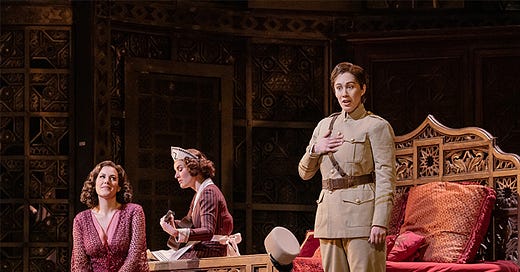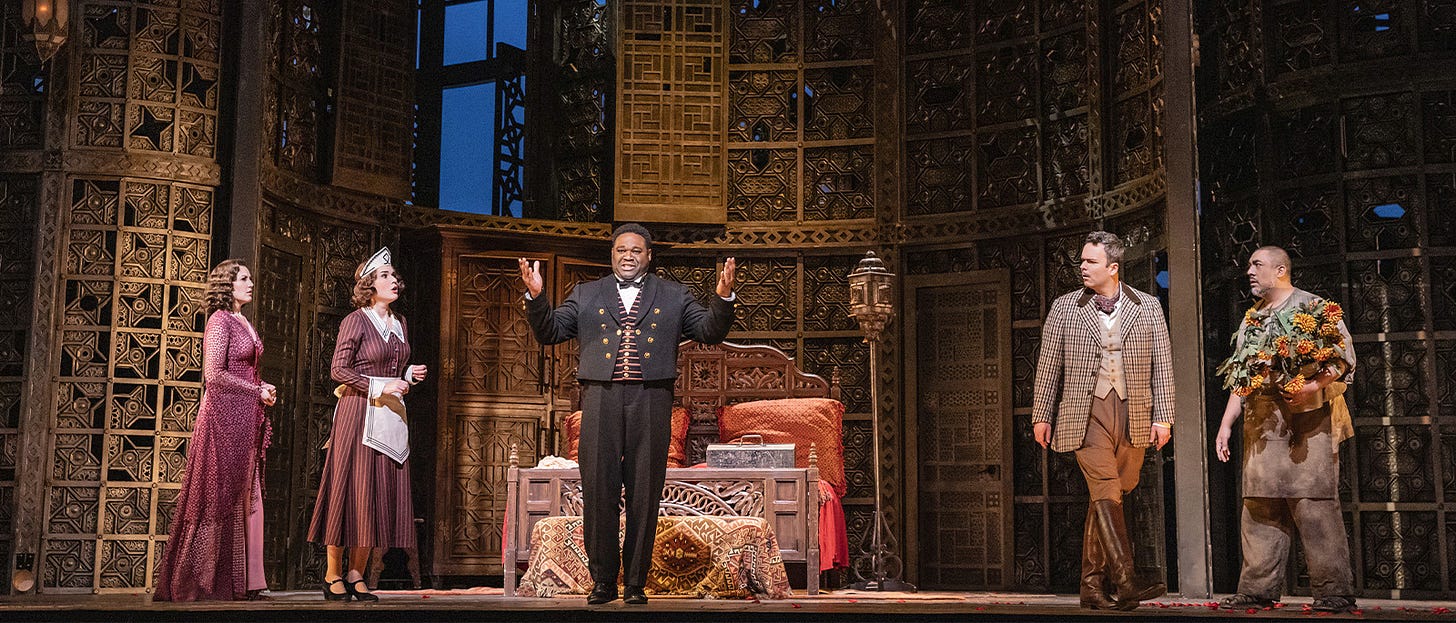We're Going In: Mozart in the Multiplex
At the Met Opera's HD Simulcast, it's beauty, bravado, and a gamble with glitches
Mary Kunz Goldman was the longtime staff Classical Music Critic for The Buffalo News, one of America’s last great city dailies. She is the author of Pennario, a deeply personal chronicle of her bittersweet friendship with Grammy-winning pianist Leonard Pennario.
Mozart’s “The Marriage of Figaro” is my favorite opera of all time. Still, when I saw it on the schedule for the Metropolitan Opera’s cinema simulcast, I hesitated.
Years ago, I went to see the simulcast of Richard Strauss’ “Der Rosenkavalier,” another opera I am crazy about. Disaster had struck — the satellite cut out right at what I consider to be the exact highest point of the opera. You wait for the moment when the Knight of the Rose appears, silver rose in hand, to present it to his future bride. And right at that moment, the sound cut out. Just remembering it is traumatic.
However, I have been to a few simulcasts since then, with no issues. Why not try “Figaro”?
It took Buffalo’s weather to make up my mind. The Saturday of the simulcast, April 26, was rainy and chilly. It was the perfect day to crawl into a movie theater and be there all afternoon. (The opera began at 1 p.m., and was scheduled to end about 5:30 p.m.)
Decision made.
We’re going in!
‘Maestro to the pit’
Without the splendor of an opera house, opera can be a tough sell. I could not get one friend to come along. So there I was, on my own, parking and crossing the lot to the Elmwood Regal.
Bus stops, industrial buildings, bad traffic, Amvets — I saw the cityscape with new eyes — opera eyes — and it was gritty. There’s a reason opera houses are supposed to be magnificent, as churches are as well. Something sacred is going on in there.
With that in mind, I had dressed up — a maxi dress, a black sweater, and a long turquoise scarf, a recent score from that very Amvets I just mentioned disparagingly. “The Marriage of Figaro” is, to me, something sacred. On paper it is an 18th century sex comedy, the story of one long crazy day of slapstick. However the music is out of this world, and you end up in tears at the end.
I bought my $24 ticket at the concession stand. Being a Buffalonian, I had tried to finagle a discount, even downloading the Regal Theaters app and creating a Regal Theater Crown Club account, all to no avail. On the bright side, there was no need to order tickets in advance. Plus, you get to choose your seat from a chart.
One reason to go to the Saturday afternoon simulcast, as opposed to the repeat broadcasts a few days later, is that the Saturday simulcast is live, so there are no previews.
Walking in, I heard the sounds of Lincoln Center, people murmuring, the orchestra tuning up.
I felt a rush of excitement.
I chose a seat in the fourth or fifth row. There was another opera fan a few seats down, enjoying a big tub of popcorn, with his seat reclined and his feet up. I arranged myself likewise in my reclining seat. Was this heaven or what?
Then came a twist: A gentleman came around advising all of us of a problem: The satellite was faulty because of a storm, and the syncing was off just a bit.
“You can come back and see the Wednesday night re-transmission at no cost,” he said. I was impressed by how he went around speaking with all of us personally, explaining the situation. It didn’t seem serious. I settled in.
“Maestro to the pit. Maestro to the pit.” You hear the announcement calling the conductor — in this case German conductor Joana Mallwitz, making her Met debut — to the podium. I love these extras you get with the simulcast. If you were at Lincoln Center, you would not hear these announcements. But we do!
And, to the tune of the breathless overture, the opera began.
A Fateful Duet
Props to the Met for this gorgeous production. The opera takes place in a nobleman’s castle, and the castle was breathtaking, with ornate, high windows that seemed to let in real light. They updated the opera to the 1930s, and costumes were exquisite, all in shades of purple and violet red.
The singers were all excellent actors, fortunate for the simulcast, which gives us closeups not seen in the opera house. (You can find cast details here.) Their voices shone. I made my peace with the flaws in the transmission and simply relaxed and enjoyed.
Even intermission was fun. Sure, it would be great to be at Lincoln Center sipping champagne. However here in our comfy seats, we are treated to backstage interviews with the opera’s stars. The conductor gave an illuminating speech about the overture and the hijinks it portended. I am a fan!
Haha — you get to see people running around in their underwear, tee hee! The gentleman in the dressing gown is Canadian baritone Joshua Hopkins, who made a very cool Count Almaviva. The Count is my favorite character in “The Marriage of Figaro.” He is a baddie, running around on his wife and chasing the maids around the sofa, but Mozart finesses his outbursts beautifully, and he gets the biggest laughs. “I’m so sick of these pests!” “That annoying boy turns up wherever I go!” Hopkins nails it with fine comic flair. The little mustache he sports is the perfect finishing touch.
Here he is discussing the drama at intermission with his long-suffering Countess, sung beautifully by Italian Federica Lombardi.
After the interviews, we got to watch stage hands setting a table on the set for the second half. Could that possibly be a table for the opera staging? It was so elaborate — down to the place cards — that I started to doubt it. Maybe it was for donors or something, I thought. Maybe they are having a dinner here after the performance.
But no, there the table was when the opera began again. I never appreciated how elaborate the Met’s staging is.
We reached the famous “Letter Duet.” This is the music that bewitched the prison inmates in the classic movie “The Shawshank Redemption.”
And in the middle of the “Letter Duet,” disaster struck.
The transmission cut out. No doubt the problem was related to the storm that had thrown the syncing off track. Whatever the reason, things would start up and stop. Then start up and stop again. Then the screen would go blank.
I almost have to wonder if some diabolical force was at work. As in my long-ago experience with “Der Rosenkavalier,” the interruption came at the moment of transcendent beauty. The “Letter Duet,” with its gentle weaving motion, puts you into a kind of trance. Now that trance was shattered.
My fellow audience members, who had been flawlessly silent throughout the opera, began speaking up.
“It’s like my TV,” someone said.
Someone else announced: “This (stinks)!”
After about five or 10 minutes of this I had to come to terms with it and leave. Even if the opera could get up and running again, I wouldn’t be able to enjoy the rest of it.
I ran into a fellow opera goer out in the hall. Though not very talkative, she said that simulcasts usually went smoothly. She did not seem bothered by the situation and planned to see the repeat on Wednesday. Wednesday was tough for me, however. I asked politely for a refund and it was granted.
That must be the answer to why I don’t go to simulcasts more often. They can fall victim to disastrous technical glitches.
Still, I admire how well we were treated. The gentleman going around explaining the difficulties with the satellite — he also came by at intermission, checking with each of us to make sure things were going OK. We were invited to return, free, on Wednesday. They try their best to make it up to you.
When things go well, they go very well. Imperfect though it may be, the Met’s HD simulcast lets you get to know an opera on a new level. I felt surrounded by kindred spirits, all of us focused on what we were seeing and hearing. And what we were seeing and hearing was beautiful.
Some things are worth a gamble.
Find details of the re-transmission of the Metropolitan Opera’s “The Marriage of Figaro” here.
Read my mini-review of the performance here.
Join me here in listening to the overture of this magical opera.
Last week’s “We’re Going In” was a journey through the Junior League’s 2025 Decorator Show House. Find that here.







I was one of two at the Regal a few weeks ago to see The Magic Flute. Was thrown off kilter when James Levine took the podium. Didn’t realize it was such an old broadcast. 🤦♀️
My fav part of any performance is the warming up of the orchestra. Like Carly Simon said: "Anticipation". I love listening for the different instruments, identifying them, judging them.